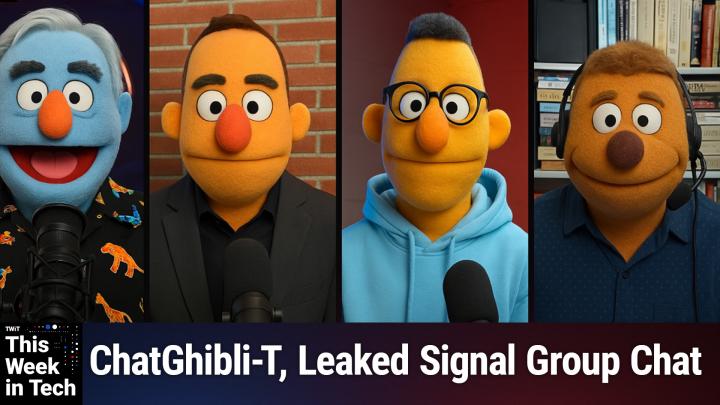Studio Ghibli Meets AI: The Art Controversy Dividing the Tech World
AI-generated, human-edited.
In a recent episode of This Week in Tech , host Leo Laporte and guests Jacob Ward, Alex Kantrowitz, and Iain Thomson leaned into one of the most viral tech stories of the week: the explosion of Studio Ghibli-style AI-generated images flooding the internet after OpenAI's new image generation capabilities were released.
The Viral Phenomenon
The conversation kicked off with Leo Laporte highlighting how OpenAI's newest image generation feature for ChatGPT 4o created a perfect storm on social media. For some reason, users gravitated toward requesting Studio Ghibli-style interpretations of everything from "disaster girl" to "grumpy cat," resulting in a viral sensation that apparently pushed OpenAI's servers to their limits.
As Leo noted, "Sam Altman says you guys are burning down the servers," referring to OpenAI's CEO pleading with users to ease up on image generation requests due to "biblical demand."
Art, Ethics, and Business Strategy
The panel's discussion quickly evolved into a deeper debate about the ethics and implications of AI-generated art, with each guest bringing a distinct perspective:
Jacob Ward emerged as the defender of traditional artistry, expressing concern about the future of animation studios and creators: "I'm seeing all these animators on social media literally weeping into the camera saying this is the end of it." Ward questioned whether unique artistic voices like Studio Ghibli would even be economically viable in a world where AI can create similar content instantaneously and at minimal cost.
Alex Kantrowitz offered a more pragmatic business perspective, suggesting OpenAI was deliberately leaning into the controversy as a marketing strategy: "I think they lean into the controversy as a marketing tool, and it's absolutely working for them." He drew parallels to the Scarlett Johansson voice controversy, noting how such moments drive massive user growth for OpenAI.
Iain Thomson observed the irony in how the entertainment industry's stance on intellectual property has shifted, noting: "I find it kind of amusing that we've just had Napster being bought by somebody, and you remember Napster, when all the studios were just like 'Intellectual property is everything. We must protect it at all costs,' and now they're ripping it off for this."
Leo Laporte took a more historical perspective, drawing comparisons to how CGI transformed filmmaking with Jurassic Park: "30 years ago, Steven Spielberg was making a dinosaur movie called Jurassic Park… I'm sure at the time the model makers were pretty upset."
The Future of Art and Creativity
The conversation ultimately centered on a fundamental question: Will AI enhance human creativity or replace it?
Kantrowitz argued for a collaborative future: "We're going to see humans and the machines work side by side to produce better outputs. It's not necessarily disintermediating Disney, it's Disney with AI that's going to be great."
Ward countered with concerns about the human experience in such a partnership: "Everybody, especially the top 10% who are using [AI] the most intensely, reported deep dissatisfaction with the job. They hated being in the role of catching the AI's work and getting it ready for prime time."
Laporte struck a more optimistic tone about human creativity's resilience: "I don't think that an AI-created Studio Ghibli movie or even a real-life action movie featuring Indiana Jones would be as good as one created by humans, acted by humans... Humans have something they do that's very different."
Legal and Cultural Implications
The discussion also touched on the legal standing of such AI creations. As Leo mentioned, "Business Insider interviewed IP attorneys who said the juries or the courts are still out on this one. But generally, copyright laws allow artists to mimic a visual style. It's not considered stealing."
The panel noted Hayao Miyazaki's own stance on AI, with Kantrowitz pointing out that the legendary director has called AI "an insult to life itself."
What makes this particular AI advancement notable is that, as Kantrowitz explained, "This is something that's being created by the model itself, not just sent out and interpreted then dropped back in. It's native to the large language model." This integration, combined with fewer safety restrictions, has allowed for both impressive technical capabilities and more controversial outputs.
Where Do We Go From Here?
As the technology continues to evolve at breakneck speed, the podcast highlighted the tension between technical progress, artistic integrity, and commercial interests that will likely define the AI art landscape for years to come.
Curious to hear the full discussion on AI-generated art, including the panel's thoughts on the Signal group chat leak, MSG facial recognition, and Gemini 2.5 Pro? Listen to the complete episode of This Week in Tech with Leo Laporte, Jacob Ward, Alex Kantrowitz, and Iain Thomson wherever you get your podcasts.
